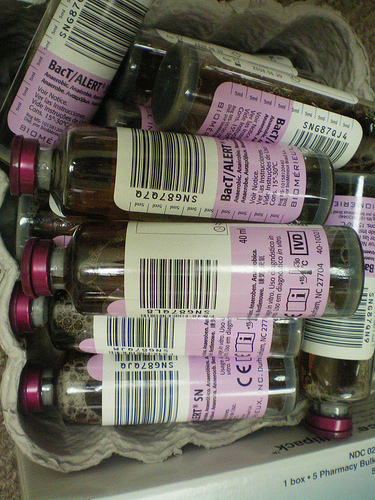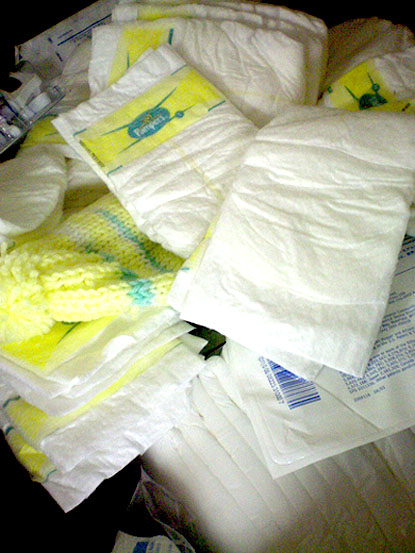 The warehouse is disheveled but for a good reason--the supplies are in a constant state of movement between the rooms. Arrive on a Saturday and abruptly there's warmth and purpose to fill the space. For four hours each week, student volunteers sort through the valuable supplies, asking for no profit in return for their help in the tedious process. Later in the school year, these supplies will be fully organized by medical unit, packaged and inventoried, loaded into a 40 foot shipping container, and sent off to Ghana.
The warehouse is disheveled but for a good reason--the supplies are in a constant state of movement between the rooms. Arrive on a Saturday and abruptly there's warmth and purpose to fill the space. For four hours each week, student volunteers sort through the valuable supplies, asking for no profit in return for their help in the tedious process. Later in the school year, these supplies will be fully organized by medical unit, packaged and inventoried, loaded into a 40 foot shipping container, and sent off to Ghana.
United 2 Heal, an interfaith humanitarian aid student organization, was formed by a few University of Michigan students just four years ago. Today they lease a massive warehouse, connect with local hospitals, save valuable medical supplies from waste, coordinate between 20 and 50 volunteers each week to sort, raise enough funds to rent a truck and transport the supplies, arrange overseas shipping, help a number of doctors in developing countries save lives...and accomplish all of this with a typical student orgs' limited resources.
Moustafa Moustafa '10 and Noha Moustafa '11 were two of the eight or nine students who got the organization started. ''We were laughing half the time. We didn't think anything would happen,'' Noha recalls.
''Our first sorting was at Hillel. We used to rent a U-Haul truck and every weekend, we'd take the U-Haul truck and we'd go get the supplies, we'd bring them to Hillel, we'd sort at Hillel, load the boxes out of the truck, sort them, and then back into the truck and back out to the storage...It had to be done in one day. They wouldn't let us leave the supplies overnight.''
How many volunteers would you have?
''We only did it [at Hillel] three times. The first time we had a lot of people, like 70 people,'' Moustafa said. He cringed a little recalling how new their organization was at the time. ''It was extremely inefficient,'' he repeated a few times. ''But it was excellent for publicity.'' The warehouse is a maze full of unlabeled cardboard boxes, but a sheet of paper hangs on each door labeling the room's designated medical unit. It is proof that the organization has made its home there, has developed a system to get the work done. United 2 Heal receives all these surplus medical supplies from a few local hospitals, but the more pressing discovery is that there is such a surplus. Without these students there would be an entire 40 foot shipping container worth of wasted supplies every year.

 Why?!
Why?!
 He points to a box full of stuffed animals, and right next to it is a tall box piled with knit hats and mittens for newborns. It turns out, hospitals need soft and lovable stuff too. Moustafa remembers casually, ''Actually, one of the sadder things we got once was an 'Infant Post-Mortem Bag.' '' Still admiring the mini pink hats, everyone laughs at the combo.
He points to a box full of stuffed animals, and right next to it is a tall box piled with knit hats and mittens for newborns. It turns out, hospitals need soft and lovable stuff too. Moustafa remembers casually, ''Actually, one of the sadder things we got once was an 'Infant Post-Mortem Bag.' '' Still admiring the mini pink hats, everyone laughs at the combo.
 This year, United 2 Heal will be sending out one 40 foot container to Ghana, and an extra 20 foot container to Haiti. Now that they have an impressive system of finding suppliers, volunteers, inventorying, shipping, and sending students abroad, they are going to aim for sustainability--sending students to talk to the doctors abroad about which supplies they really need, focusing shipments on one region, and always improving the whole process. The fact that the organization's current president, Jacob Smith, is a business major comes as no surprise.
This year, United 2 Heal will be sending out one 40 foot container to Ghana, and an extra 20 foot container to Haiti. Now that they have an impressive system of finding suppliers, volunteers, inventorying, shipping, and sending students abroad, they are going to aim for sustainability--sending students to talk to the doctors abroad about which supplies they really need, focusing shipments on one region, and always improving the whole process. The fact that the organization's current president, Jacob Smith, is a business major comes as no surprise.
